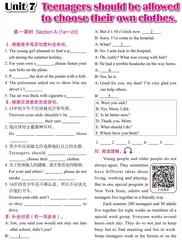Unit 7Teenagers should be allowed to choose their own clothes.

第一课时 Section A (1a—2d)
Ⅰ. 根据首字母及句意补全单词。
1.The young girl planned to find a p job during the summer holiday.
2.For your own s , please fasten your seat belts on the plane.
3.P the skin of the potato with a fork.
4.The policeman asked me to show him my driver’s l .
5.The air was thick with cigarette s .
Ⅱ. 根据汉语意思完成译句。
1. 13岁的少年不应该被允许穿耳洞。
Thirteen-year-olds shouldn’t be
their ears .
2. 他应该停止戴那种耳环。
He those
.
3. 青少年应该被允许选择他们自己的衣服。
Teenagers should
choose their clothes.
4. 为了你和他人的健康,请不要在室内吸烟。
For your and others’ , please do not smoke .
5.16岁的青少年还不够认真,所以不应该允许他们开车。
Sixteen-year-olds aren’t , so they to drive.
Ⅲ. 补全对话(有一项多余)。
A:Jim, you said you would not stay out late after school, didn’t you?
B: 1
A: But it’s 10 o’clock now. 2
B: Sorry. I’ve come to the hospital.
A: What? 3
B: No. I sent Jack to the hospital.
A: Oh, really? What was wrong with him?
B: He had a terrible headache on the way home.
A: 4
B: Yes, he is.
A:Good for you, my dear! I’m very glad you can help others.
B: 5
A. Were you sick?
B. Yes, Mom, I did.
C. Is he better now?
D. Thank you, Mom.
E. What should I do?
F. Where have you been?
1. 2. 3. 4. 5.
Ⅳ. 阅读理解。
Young people and older people do not always agree. They sometimes have different ideas about living, working and playing. But in one special program in New York State, adults and teenagers live together in a friendly way.
Each summer 200 teenagers and 50 adults live together for eight weeks as members of a special work group. Everyone works several hours each day. They do so not just to keep busy but to find meaning and fun in work. Some teenagers work in the forests or on the farms near the village. Some learn to make things like tables and chairs and to build houses. The adults teach them these skills.
There are several free hours each day. Weekends are free, too. During the free hours some of the teenagers learn photo-taking or drawing. Others sit around and talk or sing. Each teenager chooses his own way to pass his free time.
When people live together, they should have rules. In this program the teenagers and the adults make the rules together. If someone breaks a rule, the problem goes before the whole group. They talk about it and ask, “Why did it happen? What should we do about it?”
One of the teenagers has said something about it, “You have to stop thinking only about yourself. You learn how to think about the group.”
1.What can we know about young and older people in the program in New York State?
A. They live together like friends.
B. They learn to build houses.
C. They work hard together.
D. They work for 1 months.
2.What are the group members mainly working for every day?
A. Leading a different life.
B. Learning new skills of farming.
C. Getting used to the life on the farms.
D.Finding useful things and pleasure in work.
3. The group members .
A. don’t have to follow the rules
B. have no free time but on weekends
C. have to follow the rules the adults make
D.shouldn’t break the rules they make together
4.What does the teenager think of the program according to the last paragraph?
A. Pleasant. B. Helpful.
C. Boring. D. Tiring.
5. What can be the best title of the passage?
A. Free Hours in the Special Work Group
B. Teenagers and Adults Together
C. The Rules of Living Together
D. Life in New York State
第二课时 Section A (3a—4c)
Ⅰ. 用方框中所给词(组)的适当形式填空。
keep... away from make one’s own decision
manage regret talk back
1.How could you to your boss like that?
2.Bill talking back, not listening to Mom yesterday.
3.Can’t you respect me enough to let me
?
4.Children should the river.
5.Kate to find an apartment near her office last Sunday.
Ⅱ. 按要求完成句子。
1.Teachers should encourage students to speak out their own thoughts. (改为被动语态)
2.Trees must be planted in spring. (改为一般疑问句)
3.I’d like to answer your question in another way. (用同义词替换画线部分)
4.Students should be taught how to manage their own lives by their parents. (对画线部分提问)
5.I think teenagers should be encouraged to make their own decisions. (改为否定句)
Ⅲ. 完形填空。
Sometimes, children want to grow up quickly. That’s because 1 have no school rules to follow at all and they are allowed to do many things, such as driving cars, moving out, staying out late and so on. But there’s one place in Japan where children want to stay 2 forever.
Adults are not allowed to visit Japan’s Future Sweets Factory, which is a magical place full of something sweet and delicious only students in Grade Six and those who are younger are allowed.